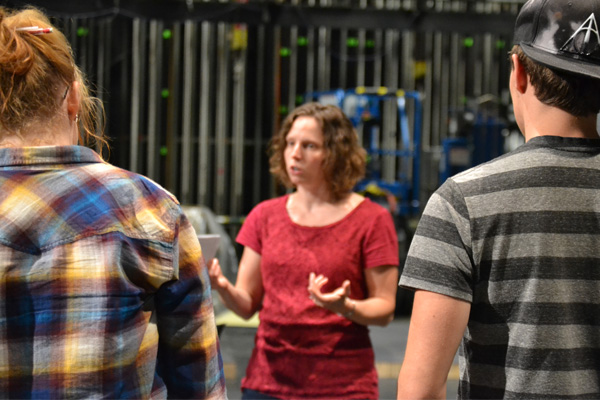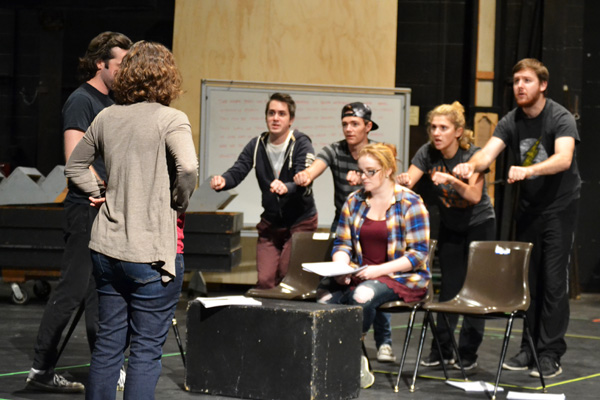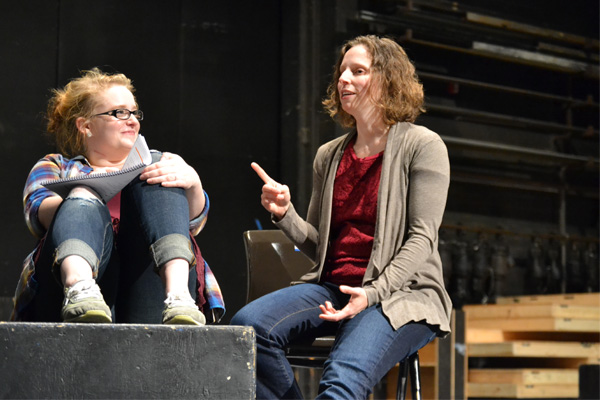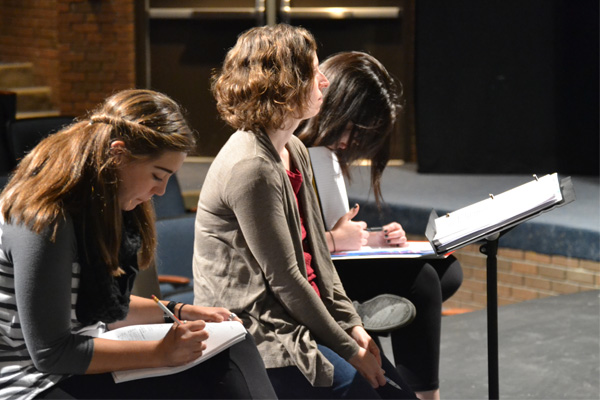In the University of Michigan Flint’s College of Arts and Sciences, faculty, staff, and students combine their passions with academic excellence as they participate in coursework, research, and creative pursuits. We are proud to spotlight some of these individuals in our new series: Pursuing Passion.

A Rock Musical with Feeling
Assistant Professor Stephanie Dean is the director of Next to Normal, an award-winning rock musical about a woman’s struggle with bipolar disorder. The show is the first production of the UM-Flint Theatre & Dance Department’s 2016-17 season and will run October 28-30 and November 4-6.
Next to Normal began as a ten-minute play called Feeling Electric that explored the medical field’s approach to mental illness. But, noted Dean, “they began to realize that they story they wanted to tell wasn’t about the treatment, it was about the people, and they began to morph it into the Off-Broadway production that opened in 2008.” By 2011, the musical had enjoyed three years on Broadway and earned numerous awards, including three Tony Awards and the 2010 Pulitzer Prize for Drama.
The musical suited both the talent pool at the university and Dean’s desire for material that would challenge her students and herself.
She began work on the production long before students stepped on stage for auditions. Her spring and summer months were filled with research about the show’s sensitive subject matter. Recalled Dean, “I wanted to know: What is fact? What is fiction? And how was the production received by audiences when it came out? There was a lot of research that went into the research that [the writers] did.”

This is Not a Case Study
Dean wanted to be sure she was both respectful and accurate when representing the journey of someone being treated for bipolar disorder. The musical touches on a wide variety of topics related to the mental health field, including prescription drug use, electroconvulsive therapy, hallucinations, depression, and suicide.
“When I was doing the research, I read an interview in which the composer and lyricist had said they had not written the show to be a case study,” said Dean. “Next to Normal takes dramatic liberties; everything that can happen to this woman does happen, and it not only affects her, but everyone around her. It’s important to understand that the writers wanted to create a story that people could relate to from many different viewpoints, depending on their own life experiences. Because of that, I truly believe that you cannot be an adult or even a teenager and not relate to something in this show.”
Dean consulted with Dr. Tom Wrobel of UM-Flint Psychology for insight on the script, and to learn about the validity of the portrayed treatments in today’s fields of psychology and psychiatry. She also talked with practicing therapists.

Now that the show is in rehearsals, the preparation is paying off: “I feel like I have command of the material, and am well prepared to address the issues in the script in a way that is effective and within the scope of reality. I also feel prepared to work actors through these difficult topics and the emotions that come with that. Understanding the content and context at a deeper level allows me to find subtleties in the script and makes me better equipped to guide the actors to more nuanced performances and to speak to the designers about a unified vision.”
Working with a Student Cast
During the summer, Dean also spent time considering the emotional toll the production could have on its student actors and stage crew. “When you are working on a musical, it is not an exaggeration to say the music does not exit your head for the entire two months,” said Dean. “Between rehearsals, memorizing lines, working on music, etc., the actors and I are spending four to eight hours a day with this material. I had to ask myself, ‘how do I bring the students in and out of rehearsals in a way that is mentally healthy for them?’”

Part of Dean’s work to answer that question took place during the summer in North Carolina where she studied a method of evoking emotion using breathing, posture, and facial expressions, rather than actual emotional stimuli. Dean has used this to inform her work with students, when she has had to help them be comfortable with difficult emotions like anger, fear, and sadness. She hopes it will also help her student cast process the heavy emotions that come with the Next to Normal script. “I’m interested in focusing the actors energies in rehearsals,” said Dean. “It is important to step into rehearsal as a group, leaving personal problems at the door, and to develop a supportive ensemble that can talk about problems if this story is hitting too close to home. Likewise, the actors have to be able to leave the characters and their problems in the theatre to avoid having an ’emotional hangover’ when they leave rehearsal.”
“Maybe the songs will be stuck in our heads, and some days it will be harder than others to put the show away outside of rehearsal; I recognize that,” continued Dean. “Alice Ripley, the actress who played the lead role in this musical on Broadway, talked in her interviews about having a very difficult time living this story night after night and not feeling it during the day.”
Dean hopes that what students are learning as UM-Flint Theatre performers will serve them well after graduation. “Part of my job as a teacher and as an acting teacher is to teach students to be physical and vocal vessels for the tough emotions their characters experience on stage without tying that too closely to their personal lives. Theatre reflects humanity. Humanity is messy. Therefore, the actors face this challenge throughout their entire professional career. I’m excited for this challenge.”
Her cast has responded very well to Next to Normal, and embraced its difficult themes. “On the first night I asked each of the cast members why this show was important to them,” remembered Dean. “I got some really interesting answers about how they each related to the material. Lots of stuff I wasn’t expecting. They each bring a lot of insight to this show.”

Connecting with the Audience
“It’s important to me to help people understand that theatre doesn’t always have to be about entertainment. It can make you think about life and help you to relate to others and still be an incredibly wonderful, fulfilling, and positive experience that you want to have again.”
Because of its relatable material and high entertainment value, Dean hopes that Next to Normal can entice audiences to the UM-Flint Theatre. “This show has a profound and immediate purpose. It’s a show that invokes conversation about a topic that our society is afraid to address, and yet mental health effects everyone to different and varying degrees on a daily basis.”
During the October 28-30 and November 4-6 weekends, performances will be held Friday and Saturday nights at 7:30 p.m. and Sundays at 2:00 p.m. Tickets may be purchased online or at the UM-Flint Theatre box office (please arrive early if purchasing tickets at the door). The Sunday, November 6, performance will feature a talk-back session with the cast, crew, and director. All are invited to attend.
For more information on showtimes, ticket sales, and performances, visit umflint.edu/theatredance/season-information or call (810) 237-6522. To reach Director Stephanie Dean, email scdean@umflint.edu.




